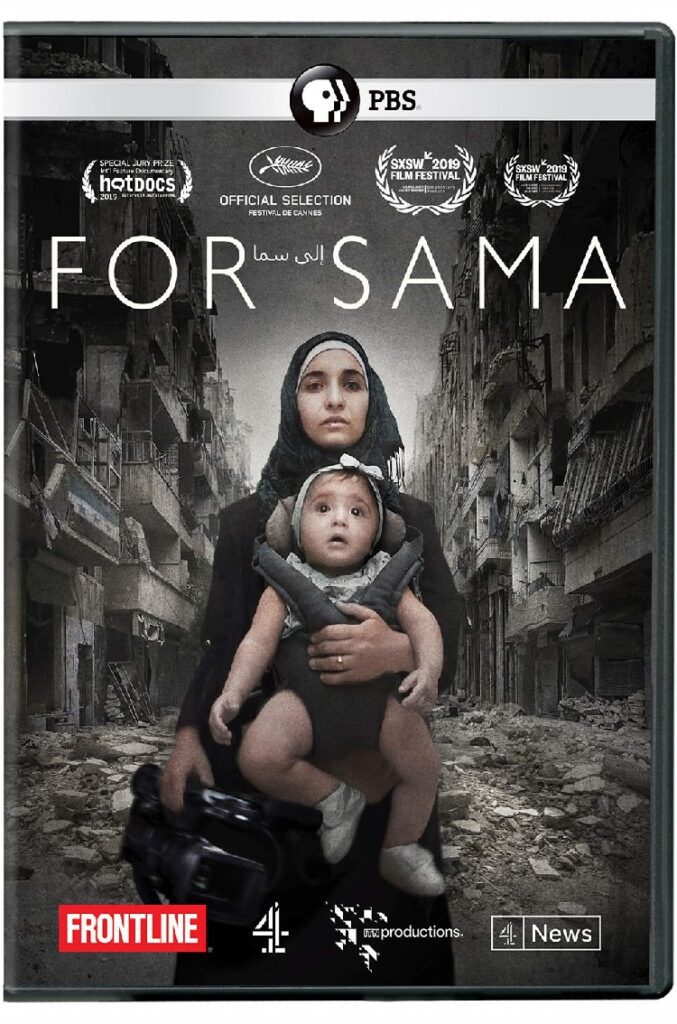
Written by Ram Venkat Srikar
If For Sama is a painting, pain is the brush. If it is a book, anguish is the pen. If it’s metamorphosized into a human, a mother’s love suffuses its heart while the fear and anger fill the mind. For Sama is beyond a personal film. Beneath the evident horrors intimately captured by the Waad Al-Kateab, the subject, narrator, and co-director of the film, lies a mother’s confession letter to her daughter. “Heart-wrenching” is a milder word to describe the horrors, while befittingly construes a mother’s agony. The agony is personal, but it resonates with the world, being the profoundly humanistic story it is.
Waad Al-Kateab, who co-directed the film with Edward Watts, chronicles her life through the Syrian Civil War and the disastrous turn it took. For some time, everything seems fine although they foresee a gloomy cloud is about to make their world dark. She gets married to Hamza, a doctor, in a light-hearted sequence. A light-hearted sequence is scarce to find by in this 97-minute tragedy. As the country goes through dark times, their daughter Sama is the only light they see in the world. In the opening sequence, when people gather to save themselves from bombing which they’ve got accustomed to, we see people joking it’s been only war since Sama’s birth. They are smiling and Hamza’s making faces to make his little daughter laugh. It seems like just another day.
It’s hard to see this merely as a film. It’s a story, and most critically, it’s a real story. A story of a woman put in horrendous conditions telling her story, herself. And she did it for five years. The first time she sees her new home, she says the garden reminds her of the house she grew in. And when the first bombing destroys the garden, it’s her new-found hope and future that’s destroyed. Hamza puts in words, that how you plant a seed, and grow it by taking care, and all of a sudden, it’s gone. The same could be said about their country too.
The presentation is not linear and it is of great effect. When the film goes back to the relatively normal times before the civilian bombing, the people aren’t aware of what lies ahead for them, and you being in a superior position who knows their ill fate, it is heartbreaking, to say the least. While physical danger persists with death wafting through the city of Aleppo, where the film’s subject and her doctor husband run a hospital, it’s the mental trauma that puts shakes you from within. For instance, the subject’s neighbor’s, a family of five with three children, is a depiction of a conventional family’s life, which the war broke. However, they are just one of the millions of families.
Unadulterated and unfiltered, the film puts real-life war horrors right in front of your eyes and you cannot help but look in distress. Death and destruction are two things that you cannot look away from here, and sadly, empathizing with these innocent people and accepting that you are just a viewer sitting far away, both in time and physicality; but that doesn’t save you from the heartbreak. The family bondage, let it be Hamza and Waad Al-Kateab, or their neighbors. People are all that stay together through thick and thin as buildings collapse and cities are destroyed. Despite the ruthless world, they are in, there’s hope in one way or the other. A childbirth scene is a brilliant demonstration of this. When a severely injured woman pregnant woman is brought to Hamza’s hospital, they are forced to perform cesarian, and the boy is a stillbirth. The emotions the scene puts you through, gives the essence of the whole film. Devastating, shaking, but there might be light at the end of the tunnel.
Waad Al-Kateab says that leaving the country might be a selfish choice, but staying there would mean living through hell. Her turmoil that she made a mistake by bringing her daughter into this cruel world, is evident. It is tragic that this is the point the world has arrived at. Also, she is worried that her daughter when grown-up, might question her parents’ choices. I firmly believe she is going to be proud of her parents. And so should we, for what they pulled off. Saving hundreds of lives in cataclysmic Syria with sheer will power and strength while standing by each other. If that isn’t the purest form of a humanistic story, I don’t know what is.